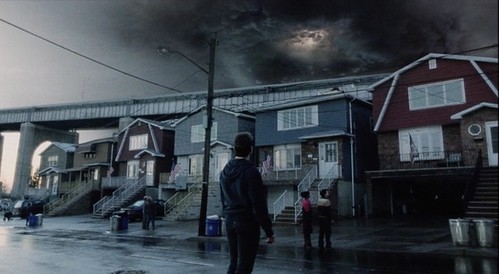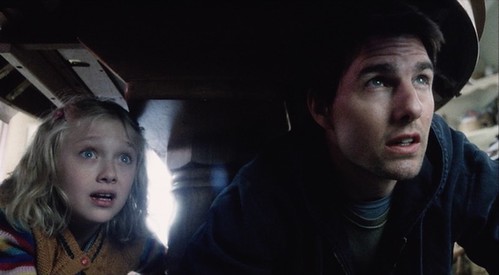Screenplay: Josh Friedman and David Koepp (based on the novel by H.G. Wells)
Starring: Tom Cruise, Dakota Fanning, Justin Chatwin and Miranda Otto

Steven Spielberg's War of the Worlds is a severely misunderstood work. Praised or dismissed as a summer blockbuster, the movie deserves reconsideration as a timely work of art; a post-9/11 allegory reflecting a climate of shock, confusion, and fear. Cahiers' placement of War of the Worlds as the 8th best picture of the decade is a step in the right direction. Hopefully, this choice will not be met with kneejerk skepticism, but with thoughtful revision. War of the Worlds is a movie that can't be analyzed so much as felt, and it holds special resonance with our post-9/11 generation. If ever there is a work capable of invoking our nationalistic sentiments in a non-exploitative manner, then War of the Worlds may be it. That it achieves this as a blockbuster is amazing; balancing simultaneously as entertainment and as an expression of contemporary sentiments.
Roger Ebert makes some astute observations in his review of the movie, but fails to understand their implications. He complains the aliens aren't believable or interesting, describing their invasion as "pointless" and concluding:
"The thing is, we never believe the tripods and their invasion are practical... It's a war of the worlds, all right -- but at a molecular, not a planetary level... A planet that harbors intelligent and subtle ideas for science fiction movies is invaded in this film by an ungainly Erector set."
Criticizing the aliens for purposelessness and adhering to a monomaniacal rule that the aliens need recognizable motives misses the point. The aliens and their tripods are not an extraterrestrial threat so much as a metaphor of man's capacity for war; pure violence incarnate. Note that the alien tripods do not "land" from outer space but come up from beneath our cities and our homes, suggesting they have been with us all this time. Symbolically, they are not an external threat but represent the inner chaos and capacity for destruction that lies beneath a seemingly benign and civil facade. The "war" the title suggests is not a macroscopic fight between man and alien. Rather, it takes place, as Ebert said, on the molecular level; an internal "fight" between man's polarizing tendencies towards violence and nonviolence. The picture becomes a roadsign; cautioning us against reactionary violence and eye-for-an-eye. It’s not simply preaching anti-violence, but rather asking us to proceed with caution and ask ourselves where our responsibilities lay.
The pointlessness of the alien attacks is necessary for meaning and emphasizes the nonsensical, inexplicable consequences of violence. Ray Ferrier (Tom Cruise) finds himself at a loss for words. How does he explain to his children the horrors he's witnessed? How do you explain people not just being killed, but vaporized into ash all around you? To insist that such violence needs "purpose" borders reprehensibility. While I understand Ebert's complaint with respect to narrative, he inadvertently advocates violence in the process by trying to rationalize it. War is rarely so clear-cut. You often hear of veterans after the war, saying how nobody even remembers why it started. The same applies here. It becomes very easy to stray from the path we set out upon; to lose our sense of purpose and wander aimlessly into battle.
Spielberg is not making another Close Encounters of the Third Kind or E.T.: The Extraterrestrial, where aliens invoked genuine beauty and wonderment. In War of the Worlds, the aliens and their tripods are supposed to be ungainly. As avatars of violence, their grotesquery and instability make sense. War of the Worlds proposes the apocalypse, but its strength lies in balancing on the precipice between a life-affirming, yet cautious optimism, and a meaningless, nihilistic void. Violence can be overcome and it does have weaknesses. The movie offers us hope that chaos is not invincible and affirms the existence of harmony and humanism in the universe.
Somehow, War of the Worlds is criticized for a lack of emotion. This becomes difficult for me to understand because when I recently watched the movie again, I was struck by how poignant these images were, in part because they are tied to my own sense of nationalism. When Ray takes his kids to his ex-wife’s house and the plane hits, Spielberg is reenacting 9/11 on an expressionistic microcosm. Tragic events like these bring the child to the forefront. On one level, the urge to shield our children from the horrors of violence becomes an anchor; grounding us from the ensuing chaos. On another level, these events make us all like children; regarding violence with wide-eyed shock. Such concepts are hardly shallow, and how critics can ignore or belittle them is beyond me. These same critics go on to criticize the 9/11 allusions as exploitation. So contemporary issues are taboo for blockbusters? The mainstream picture can't be art? You can only deal with these issues in a literal sense? Preferably via "independent" filmmakers with shaky camera work? Is the allegory dying, or is it already dead?
Critics who say the movie lacks emotion must have ice water in their veins. Not that they don't feel anything, but they resist and reject that emotional pull. 9/11 is unacceptable subject matter, not because of how it's handled, but because it makes us uncomfortable and blockbusters can't be serious. Yet War of the Worlds is not using 9/11 for cheap thrills, but as a springboard into discussing violence and our national atmosphere. It, along with Minority Report and Eastern Promises, present unique and sound approaches to violence in an age where death (and rape) become ever more casual in the movies and on TV. If it makes violence uncomfortable, it's doing its job. Those three movies handle violence effectively because they do not rely on increasing detail or raising body count. Minority Report is essentially a thesis on violence, setting up a hypothetical world where murder is virtually nonexistent. A death in Minority Report shocks us and resonates deeply, because the world of the movie has convinced us murder doesn't exist; lulling us into a sense of security. Eastern Promises, as I've written before, doesn't pile up a faceless body count. Each act of violence is tied to the dramatic and emotional arc of the picture. And War of the Worlds. The overwhelming loss of innocent human life is intensified by those 9/11 allusions. What would you rather have: a blockbuster that belittles human life for entertainment (Lord of the Rings), or one that presents violence that does disturb us?
War of the Worlds is not a picture that relies on its narrative so much as the images it presents. Ray with his daughter, watching the storm brewing in the distance evokes our false sense of impunity before 9/11; the illusion that the US was invulnerable to attack. It’s not simply the attacks of 9/11, but the falling popularity of our subsequent actions. 9/11 was a slap in the face; a wakeup call that War of the Worlds captures magnificently. Other images, like Ray seeing people turn to ash all around him, his speechlessness afterwords, or his frustrations as he tries to fulfill his role as a parent are humanist at their heart. Ray is not looking for vengeance but to protect basic human values. These values are tested and their complexity is enriched when he needs to kill Harlan Ogilvy (Tim Robbins) in order to protect his daughter. War of the Worlds is not a black and white message movie offering simplistic morals to complex situations. If the movie has plausibility, it lies in its characters’ actions. These are believable reactions to a state of chaos and cover a vivified spectrum of human nature. There is a desire to seek vengeance, protect our children, stare in wide-eyed wonderment, clamor for our own safety, act with benevolence, or go mad.
The mainstream picture is denied contemporary allusion whenever the critics feel like it. Not because of how it handles the material, but because of what it inherently is. It depends on who's in the movie and who directed or funded it. War of the Worlds is socially conscious and moralistically sound; its metaphor of violence is hardly outrageous or blameworthy. I don't even think it's a partisan picture. And somehow it receives more flak than subversive, politically biased, poorly constructed messes like Slumdog Millionaire or Avatar.
War of the Worlds is a movie that must be felt. Analyzing it shot-by-shot can be done, but such a method is reductive and runs the risk of losing the feel of the work. Rejecting a movie simply because it invokes our nationalist sentiments reeks of elitism; arbitrary rules are put in place dictating what gets put on the pedestal of Art and what's throwaway entertainment.
"Are we still alive?"
-Rachel




No comments:
Post a Comment